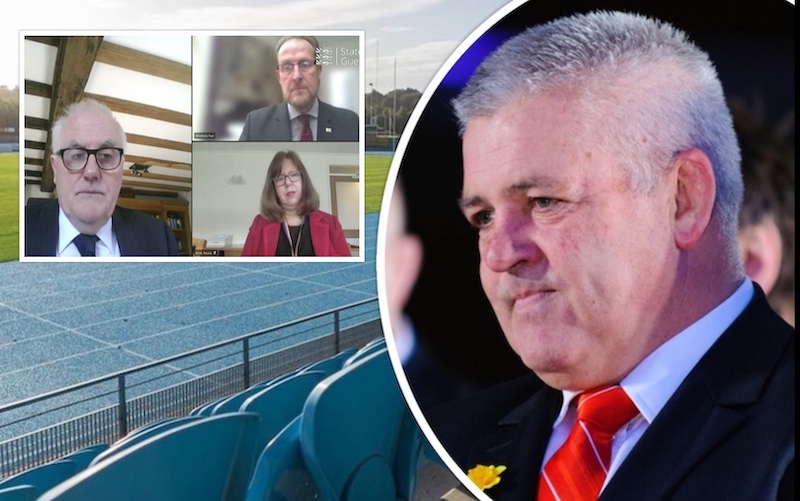


Guernsey's Chief Minister and Health President have revealed a shock desire to charge media outlets and other businesses for asking the Government questions.
Health boss Al Brouard (pictured top, left) - whose committee holds the largest budget across the States of Guernsey - made the bizarre declaration that "I don't know where I signed up to openness and transparency” when becoming a Deputy.
Chief Minister Peter Ferbrache (pictured top, right) said the public should simply trust its political leaders to always act openly and with integrity.
The extraordinary comments were made during the opening of debate into potential changes to the island's current Access to Public Information Code.
Scrutiny President Yvonne Burford set out her committee's majority view that an independent appeals panel should be introduced instead of pursuing a full Freedom of Information Law - which was advocated by her predecessors - who ran out of time before the 2020 Election to submit their own proposals to the States.
She described a voluntary appeals panel as a "pragmatic, practical, cost-free and swift" improvement to the API Code. However, there would be no law backing it up, meaning the States would not be compelled to answer information requests if it does not want to.
I really hope that the media tomorrow will be all over this. The CM endorsed the same point later in the debate. Is it now formal States policy that the media should pay a commercial amount for receiving public information?
— Christopher Green (@advocategreen1) June 16, 2021
Pictured: Former Deputy and Scrutiny President Chris Green was shocked by the comments made by two of Guernsey's most senior politicians.
Scrutiny Vice-President Simon Fairclough spoke passionately against his committee's proposals, citing the former committee's departing comment that Freedom of Information "is an essential and integral part of the scrutiny of government."
For an appeals system to have integrity, Deputy Fairclough said it needs to have the power to override the States' refusal to respond.
Meanwhile, Deputy Sasha Kazantseva-Miller said she sometimes struggles to extract much-needed information from other departments and colleagues within the States.
"I am struggling to get access to information that I require that would be in the direct interest of my mandate and the wider public interest as well," said the Economic Development Committee Member.
However, Deputy Brouard took a different view entirely. He said he was fed up with businesses going on "fishing trips [from the States] to get data for their own marketing" and media outlets posing questions to the States' communications team.

Pictured: Deputy Matthews was unimpressed by the way Deputies Brouard and Ferbrache responded to the debate.
"I find sometimes that the media are running commercial stories to sell newspapers that they sell because they get advertising monies by doing so," said Deputy Brouard.
"I would very much like to charge for those stories that I provide to them. It’s a very easy way to get a very easy story."
He later reflected that his comments were not aimed at "genuine enquiries, but for other ones I find it difficult to justify the time that is taken."
Guernsey's Chief Minister supported Deputy Brouard's comments, suggesting that the States should not be wasting its time discussing Freedom of Information.
"Freedom of Information is something that not very many people are interested in because the States is already open, transparent and ethical," he said.
"For every right that we have, we have a duty, and we have a duty to act sensibly. If the Press want information they should be given it. But if they are a commercial entity, they should pay for it."
He urged colleagues to reject the proposal: "I bet none of you [fellow States Members, ed.] lose any votes at the next election based on how you vote on Freedom of Information."

Pictured: Statements from Deputy Ferbrache and other senior States officers about Warren Gatland's visit over the Bank Holiday weekend were later proven to be untrue, following media questions about the Lions Coach's two private meals with States officials. Deputy Ferbrache apologised, before then deciding to threaten legal action against anyone who called him a liar.
Deputy Carl Meerveld, President the States Assembly and Constitution Committee, which is responsible for overseeing how the States Assembly is run, suggested that responding to media requests "is a cost of doing business and it’s something that all democracies have."
Deputy Nick Moakes, meanwhile, said there was "no real idea of the costs" and that the States' limited funds should be used wisely.
"There are many other things I would rather spend the money on."
While the detailed costs of having a Freedom of Information Law are not known, neither are the costs of administering the current Access to Public Information Code.
Deputy Fairclough said the number of information requests - mainly from members of the public - has risen from 15 to 60 per year in the last six years.
"They range in complexity and subject matter, and are dealt with by some of our most senior civil servants. Many of the costs are already being borne by the States either directly or indirectly."
Debate continues this morning on the proposals.
Comments
Comments on this story express the views of the commentator only, not Bailiwick Publishing. We are unable to guarantee the accuracy of any of those comments.